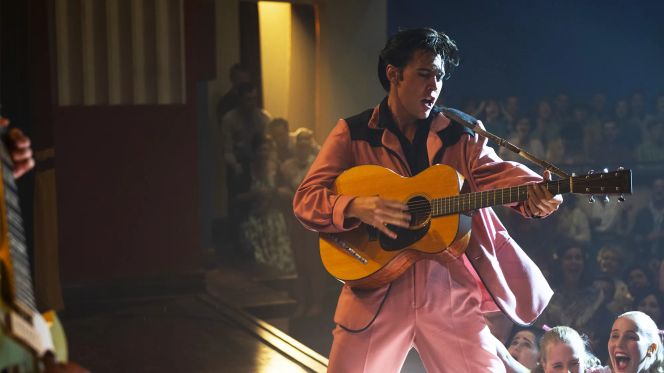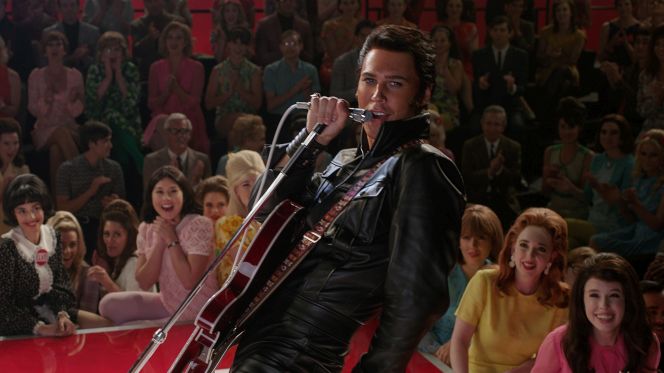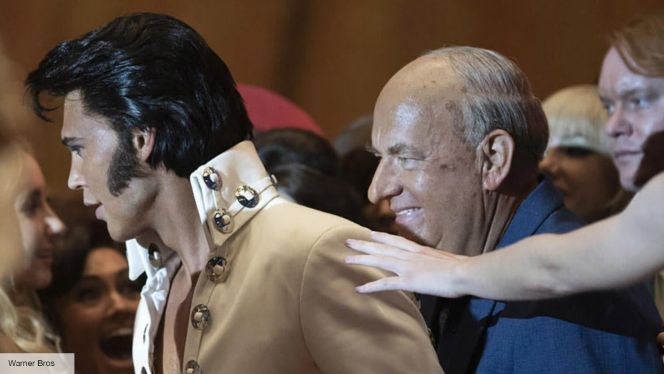MOVIE REVIEW – The life of Elvis Presley, one of the greatest musical icons of all time, is the subject of director Baz Luhrman’s film, in which the title character is joined by his – highly controversial – music manager, “Colonel” Parker, played by Tom Hanks, who also narrates the story. But does this new biopic live up to the legend?
It’s fitting that the notoriously maximalist filmmaker Baz Luhrman returns to cinemas after a hiatus of nearly a decade with a film about one of the most maximalist performers in American history. The Colonel, who is the Salieri to Elvis’s Mozart, or, more aptly, the Doctor Sivana to Elvis’s Captain Marvel, is the film’s totally unreliable narrator, and in that way, it is a departure from the usual musical biopic. Instead of, for example, Elvis having to rethink his entire life before a stage performance, this film begins with the dying Colonel talking about his relationship with Elvis and the many ‘misconceptions’ about their work and life.
Hanks was an “interesting” choice…
It’s a rather odd choice, not because the idea of an Elvis film framed around the story’s protagonist is inherently a bad idea, but because the film can’t quite decide whether Parker is really the protagonist or not. Even beyond the narrative, “Elvis” seems to want to portray Parker as a lovable uncle who genuinely wants the best for him – even if he slowly stabs the legendary musician in the back. But this is not helped by the choice of the otherwise highly versatile acting legend Tom Hanks as Parker.
That’s mainly because Hanks wears so many prosthetics and uses such a ridiculous and exaggerated Bond villain accent that classic 007 Ernst Stavro Blofeld, or say Colin Farrell’s Penguin, seems a nuanced performance by comparison.
What distinguishes “Elvis” from many musical biopics is that there is no promise of a return after the inevitable downfall of the star, no return to the stage after rehab. Instead, as in ‘Amadeus’, there is a sense of doom and tragedy throughout the film, with Luhrmann constantly harping on what Elvis might have been if it hadn’t been for this Colonel Salieri: international star, political activist, or star of ‘A Star is Born’, alongside Barbra Streisand in the lead role.
While the plot would be interesting and the visuals are certainly sumptuous, the main problem is the pacing. Elvis is in many ways too long a film, which should either have been shorter or made as a mini-series. But the film’s framing from Parker’s point of view and the constant cuts mean that “Elvis” constantly loses momentum. Similarly, Luhrmann’s trademark mixing of old and new songs backfires. Rather than merely using the original music, he has tried to make Elvis’ influence of the time resonate with audiences today by adding modern remixes of songs by Doja Cat and others to the soundtrack and even including the Backstreet Boys in the soundtrack, an altogether confusing solution.
…Austin Butler, on the other hand, is a hit
And it’s hard not to get excited by the flickering musical scenes, like teenage girls at an Elvis concert. This is due in no small part to the outstanding and career-defining performance of Austin Butler as the ‘King’ himself. Even if his looks don’t always fit perfectly, Butler effortlessly captures the essence of Elvis, effortlessly hitting the mannerisms, the boyish charm and the dusky-eyed but sensual-for-women eyes that captivated a nation the mesmerising leg and hip movement that introduced sexuality to American television through his musical performances.
Like Taron Egerton in Rocketman, Butler shows his skill at imitating the King’s voice – he sings the vast majority of the songs from the 1950s. Still, as the film progresses, Elvis’ voice changes dramatically, increasingly using Elvis’ authentic voice. Sadly, fat Elvis fans may be disappointed; the film skips over the final days and instead focuses much more on – you guessed it – Colonel Parker, played by Tom Hanks.
Aptly exaggerated cinematic style
Luhrmann proves to be the perfect choice to make a comic book-like film about Elvis that is maximalist and exaggerated in every conceivable way, from the clearly overlong running time, to the lavish set design and the insane camerawork that follows Elvis’ movements as obsessively as his fanatical fans did back in the day.
Comic bookishness, by the way, not only applies to the cinematic style, but also manifests itself through Elvis’s love of comic books. The former rock star has always wanted to be a superhero who rescues his imprisoned father, and he has – figuratively speaking – partly succeeded. The film’s lightning-fast editing and concert scenes are somewhat reminiscent of this comic book style.
While “Elvis” is not a super in-depth look into the life of the King for hardcore fans, it does try to put his life in a different light than the one that modern pop culture focuses on. Luhrmann is very interested in Elvis’ relationship with black music and culture, and his love and respect for it. This film enthusiastically counters the notion that Elvis was just stealing from black music, and shows him openly praising black musicians who in turn drew inspiration from him.
Would Elvis be a BLM activist today?
Elvis himself is mostly at home listening to and singing gospel music, spending his time on Memphis’ Beale Street, home of the blues, hanging out with B.B. King (Kelvin Harrison Jr.) while listening to Little Richard (Alton Mason) and Big Mama Thornton (Shonka Dukureh). Elvis was a real rebel in this respect: although it may seem strange nowadays, especially after the BLM movement, the segregationist politicians of the 1950s must have been a source of fear for anyone who, as a white celebrity, had any kind of connection with the African-American community, and the film gives a great insight into this through the life of Elvis. So Elvis was a very serious fuse in 1950s America, not only because of his ‘overly erotic’ stage moves but also because of how he approached African-American culture.
Nevertheless, the film goes a little too far with this idea and portrays Elvis almost as a political activist. His pain over the state of the world seems a bit forced and not very authentic and appears to serve only to portray Elvis as a bigger rebel than he really is.
Did it take our breath away?
“Elvis” is Baz Luhrmann’s best film and one of the outstanding – if not the best – of his musical biopics. Perhaps it could be placed above the Freddie Mercury film and the Elton John biopic Rocketman, but 2018’s “A Star is Born a Star” was a slightly better film. The film itself is just as over-the-top and grandiose as Elvis himself was, but the cinematic narrative device of Colonel Parker, played by Tom Hanks, framing the plot through him, doesn’t always work well.
Still, Austin Butler’s stunning performance, sumptuous production design and comic book-like editing make for a unique film that is an excellent fit for the character of Elvis: full of personality, flash, talent, and, while somewhat empty, undeniably enjoyable.
-BadSector-
Elvis
Direction - 7.4
Actors - 7.2
Story - 6.8
Visuals/Music/Sounds - 9.2
Ambience - 7.5
7.6
GOOD
"Elvis" is Baz Luhrmann's best film and one of the outstanding - if not the best - of his musical biopics. Perhaps it could be placed above the Freddie Mercury film and the Elton John biopic Rocketman, but 2018's "A Star is Born a Star" was a slightly better film. The film itself is just as over-the-top and grandiose as Elvis himself was, but the cinematic narrative device of Colonel Parker, played by Tom Hanks, framing the plot through him, doesn't always work well. Still, Austin Butler's stunning performance, sumptuous production design and comic book-like editing make for a unique film that is an excellent fit for the character of Elvis: full of personality, flash, talent, and, while somewhat empty, undeniably enjoyable.




















Leave a Reply